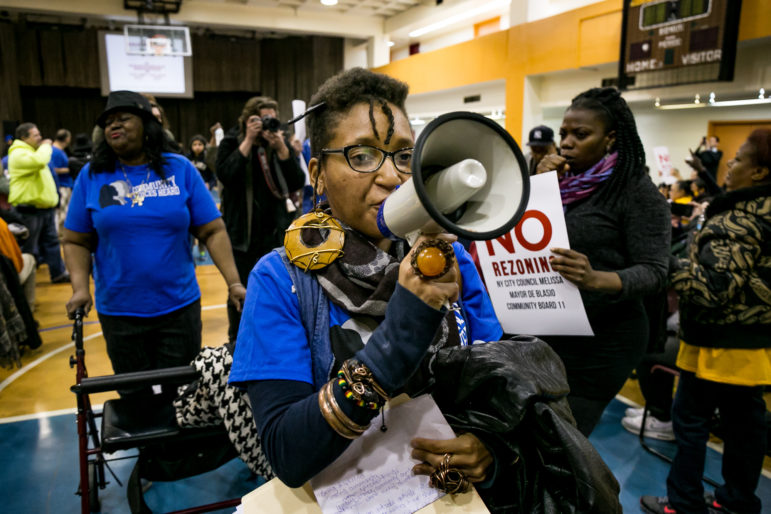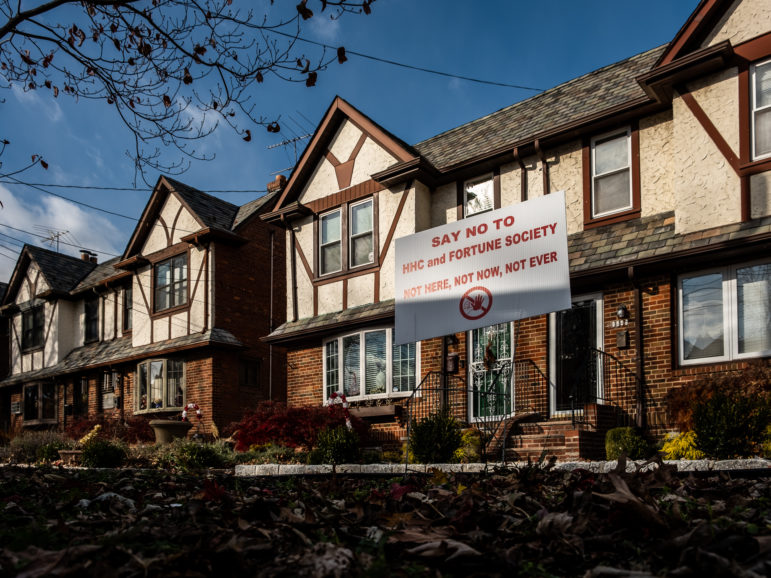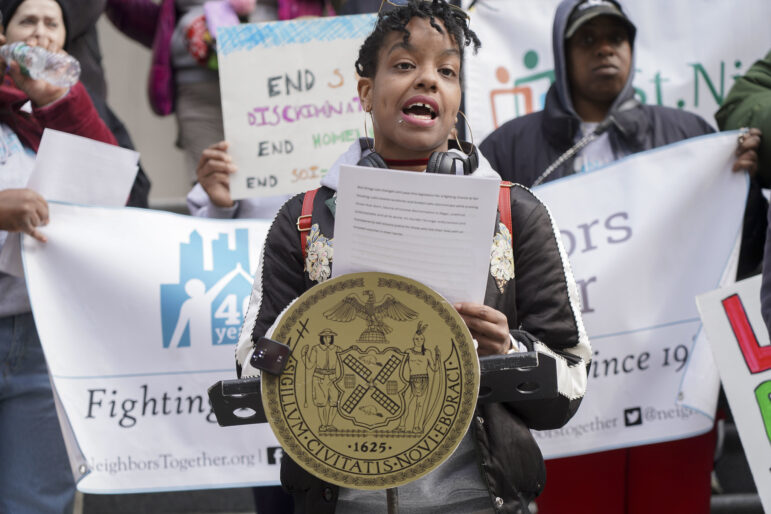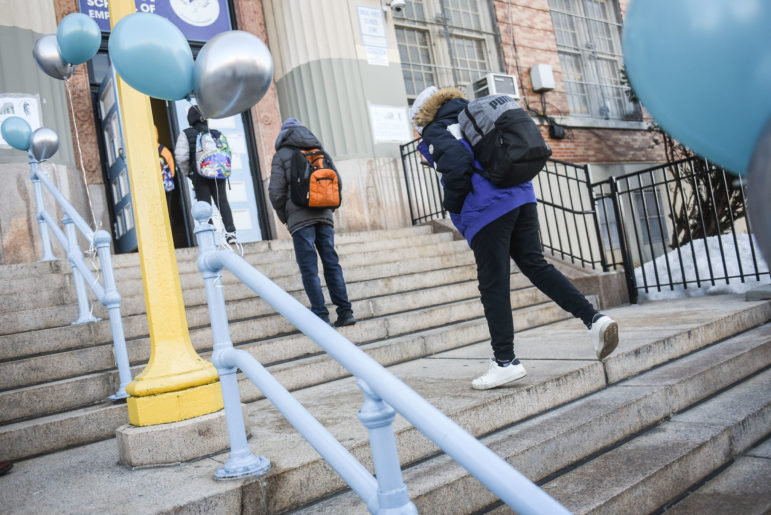
Adi Talwar
Robyn, a leader of Community Voices Heard, leads the call for more deeply affordable housing.
At a packed meeting on the mayor’s rezoning plan for East Harlem last night, members of Community Voices Heard marched out to the street and held a rally, while members of El Barrio Unite refused to allow the city’s presentation to continue, with both groups expressing concern that the mayor’s housing plan would result in the massive displacement of the neighborhood’s existing residents.
The two groups had planned their protests separately, and their demands were somewhat different. Community Voices Heard called on Speaker Melissa Mark-Viverito to ensure that the city’s plan included a $200 million down payment to NYCHA, that 30 percent of the total housing be affordable to families making $23,000 and less, and that 40 percent of the housing on public land be affordable to that income bracket.
The group was a key partner of the speaker’s office, Community Board 11, and Borough President Gale Brewer in crafting the East Harlem Neighborhood Plan, upon which the city claims its own rezoning plan is based. It is also a regular recipient of Mark-Viverito’s discretionary funding. Its demands represent an effort to ensure the city lives up to the Neighborhood Plan’s promises—and goes a bit beyond it, by guaranteeing more units for very low-income residents.
El Barrio Unite, which took no part in the crafting of the Neighborhood Plan and has never received discretionary funding from the speaker, rejects a rezoning altogether, citing concerns about the levels of affordability in the promised housing, what they argue is the speaker and the mayor’s poor tract record of creating truly affordable housing, and the unclear status of the city’s community preference policy. (The policy ensures that the residents in an affordable housing project’s community district are given preference for 50 percent of the affordable units, but is currently facing a court challenge.)
The commotion began when members of Community Voices Heard interrupted City Planning’s presentation to make their three demands.
“We are with Speaker Viverito and the Neighborhood Plan to move [forward] 100 percent affordability on public sites,” said a Community Voices Heard member, who gave her name as Robyn. “We all are standing up today to further define what we mean by affordability—and we really don’t want ‘affordable.’ We want ‘low income!'”
They then marched out to the sidewalk, where members described their struggles with deteriorating conditions in public housing, evictions that lead to homelessness, and displacement from other neighborhoods—while expressing hope that the speaker would listen to their needs.
“When the president-elect is feeding our worst fears, this is not the time to hesitate,” said member Philip Malebranche.
Meanwhile, inside the auditorium, members of El Barrio Unite continued to disrupt the city’s presentation. George Sarkissian, representing Mark-Viverito, and Matthew Washington, representing Brewer, intervened and tried to negotiate with Roberto Anazagasti, one of the leaders of El Barrio Unite. In the end, they seemed to agree that the Department of City Planning would get a few minutes to speak, followed by members of the group.
Calvin Brown of the Department of City Planning, Sarkissian and Washington tried to assure the crowd that they were all aware of residents’ concerns about levels of affordability and emphasized that they were seeking ways to create more low-income housing.
“From our offices perspective and the project partners in the steering committee, 100 percent of the units on the public sites are going to be affordable,” said Sarkissian. “We’re going to work hard. It’s not done yet. We’re working with our agency partners, at [the Department of Housing Preservation and Development], to maximize the number of units at the lowest incomes.”
Yet when Roger Hernandez, another leader of El Barrio Unite, took the stage, he showed little faith in these remarks.
“We totally reject the bullshit of rezoning, and I’ll tell you why…Rezoning doesn’t offer any benefit to the majority of the people in this community,” he said. In response to Sarkissian’s promises, he added, “If I don’t see it on paper and it’s not part of the law, then I’m not buying it.”
“How can they protect us when they’re already taking money from developers?” asked Marina Ortiz of East Harlem Preservation, referring to both the speaker and the mayor. She expressed doubts that in the current political climate, HPD, which receives 87 percent of its operating budget from the federal government, will be able to deliver on its promises.
“Stop the rezoning or we will displace these politicians when then run for office in 2017,” she said.
As the meeting broke into small-group conversations, City Limits found Robyn of Community Voices Heard member and an El Barrio Unite member who had just met one another and hoped to organize together in the future.
“At the end of the day we’re still fighting for the same basic goals,” said Robyn, and the El Barrio Unite member nodded in agreement. “I think it’s alright for us to have differences.”









6 thoughts on “Dueling Protests at Meeting on East Harlem Rezoning”
Pingback: Watch Video from a East Harlem Rezoning Forum | City Limits
“Colvin brown” is my cousin and his name is Calvin brown not Colvin
Pingback: November 2016 East Harlem News
Pingback: News (November 2016)
I attended this meeting, and was highly disappointing that there was no consideration for the voices of others who reside within the community to say their peace, or even to hear what was being said by the city planners, whether we bought it or not. this was the opportunity to speak about it and inform them of what changes might actually be ok and which ones we would definitely reject! i hope that the next meeting on DEC 15th, they respect everyone in the community and do not interrupt the meeting in the same manner, but instead wait until its time to have the floor to speak! I work and live in east harlem and have just an equal say as any other group protesting, and I even had other concerns that could not be discussed because of the interruptions.
As an MWBE developer, a New Yorker, and a member of the community, I cannot understate the importance of dialogue between the City, Department of City Planning, and the community. And I also can’t understate the importance of respecting the people who are doing what they can to protect and grow these vibrant, established communities. This must be a measured approach. – Dan Hoeg, The Hoeg Corporation